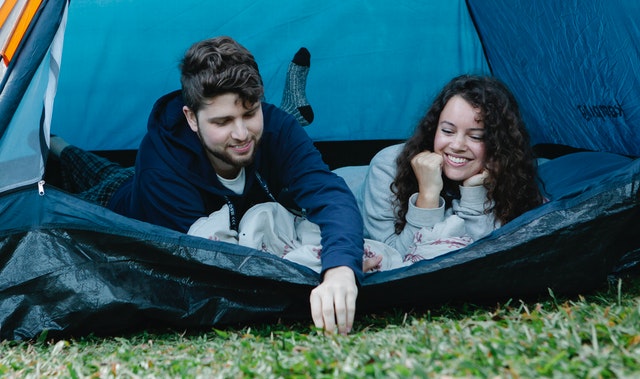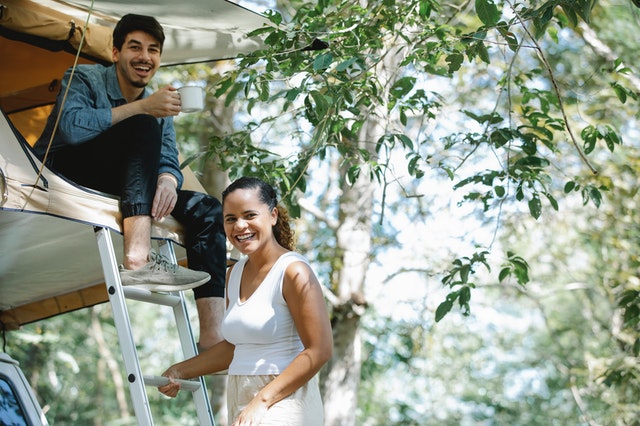There is nothing quite like spending time in the great outdoors, and camping is one of the best ways to do that. However, it is important to be aware of the risks involved in camping and take steps to ensure your safety. This article will provide some expert safety tips that every camper should know.
Vagabondish is reader-supported. When you buy through links on our site, we may earn a small affiliate commission. Read our disclosure.
1. Choose a Safe Campsite
When you’re planning a camping trip, one of the most important things to consider is choosing a safe campsite. There are many potential hazards that can be found in any wilderness area, and it’s crucial that you take the time to select a spot that will minimize your exposure to them. Seasoned camping enthusiasts from Camping Forge recommend picking a campsite far away from areas with signs of bear activity. If you are camping in an area with wildlife, make sure to keep your food stored properly so that you don’t attract any unwanted guests.
Here are some expert tips to help you choose a safe campsite:
- Avoid areas with potential hazards like steep cliffs, deep water, or loose rock, and look for an area that is well-lit and free of hazards such as large rocks or trees that could fall.
- Aside from bears, look for signs of recent animal activity, like fresh tracks or scat, and avoid setting up camp too close to these areas.
- Make sure you have a clear line of sight to the surrounding area so that you can quickly identify potential threats.
- Choose a spot that’s easily accessible in case you need to make a quick getaway.
- Avoid campsites that are located close to popular trails or roads, as they can attract criminals or other dangerous people.
By following these tips, you can help ensure that your camping trip is safe and enjoyable.
2. Avoid Hiking Alone
This is one of the most important expert safety tips that every camper should know. While hiking is one of the best activities to do while camping, it can also be dangerous if you are not careful. There are many dangers associated with hiking alone, including getting lost, being injured, and encountering wildlife.
If you do hike alone, be sure to let someone know your plans and carry a map and compass. Even if you’re an experienced hiker, it’s always best to hike with a friend or group. That way, if something does happen, there will be someone there to help. Stay on well-marked trails and be aware of your surroundings at all times. Hiking in groups is always the safest option.
3. Be Prepared for Weather Conditions
Whether you’re camping in the middle of summer or in the dead of winter, always be prepared for changes in weather conditions. Before heading out on a camping trip, check the forecast and plan accordingly. Make sure you have the appropriate clothing and gear for the forecasted conditions and be aware of any potential hazards that might arise. For example, if there is a chance of thunderstorms, know where the nearest shelter is. If severe weather is expected, it is best to postpone your trip or choose a different location. Once you are on your trip, pay attention to the weather conditions and be prepared to change your plans if necessary. By being prepared for all kinds of weather, you can help ensure a safe and enjoyable camping trip for everyone.
4. Don’t Swim Alone
Swimming is another great activity to enjoy while camping, but it can also be dangerous. An expert safety tip that every camper should know is to avoid swimming alone. Here’s why:
If you’re swimming alone, there’s no one there to help you if you get into trouble. Sure, you might be a strong swimmer, but anything can happen. If you have a cramp or your foot gets tangled in something underwater, you could be in big trouble. There are many dangers that can occur when swimming alone, such as getting lost, being attacked by a fish or other animal, or getting injured. If you are going to swim, make sure to have someone with you who can help if anything goes wrong. Make sure to always swim with a partner and never swim in areas where there are no lifeguards. Be careful of currents and always wear a life jacket when swimming in open bodies of water.
5. Be Aware of Your Surroundings
One of the most important safety tips for campers is to be aware of their surroundings at all times. This means being aware of the terrain, the weather conditions, and any potential hazards. If you are ever in doubt, it is always best to err on the side of caution and avoid any potentially dangerous situations.

By following these expert safety tips, you can ensure that you have a safe and enjoyable camping trip. Always remember to use common sense and be prepared for anything that might happen while you are in the great outdoors.


